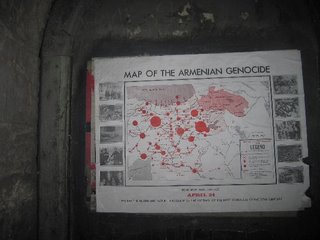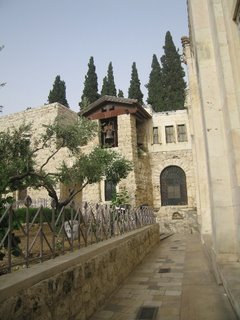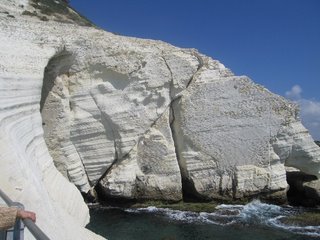First of all, apologies for the long break. After getting back from Israel and Italy, I came down with the cold from hell (still recovering), and have had a lot of catching up to do.
To start with, here's my
Boston Globe column about the trip, including a line that got cut for space from the version in the
Globe.
''BUT ISN'T IT dangerous?" several people asked me when I told them I was about to make my first trip to Israel, for a week. Yet during my stay in Tel Aviv and Jerusalem, I felt safer than in most American cities. Life feels normal. Once in a while, there are the small reminders that it's not. At the entrance to Tel Aviv's Opera Tower shopping mall, security guards search the bags of people coming in.
The Israelis I spoke to were mainly preoccupied, like people anywhere else, with things other than politics. Even the Iranian president's virulent anti-Israel rhetoric and the prospect of a nuclear-armed Iran does not seem to be a cause of major worry. Yet many of them, in the back of their minds, are aware that their country is one of the epicenters of global conflict.
''So," said one cabby in Tel Aviv, ''you see Israel all the time in the news, and now you finally decided to come and see for yourself what it's really like, yes?"
Of course, a weeklong vacation in two Israeli cities, mainly spent doing the usual tourist things, does not exactly qualify one to come to any conclusions. But even in a few days, this country makes a powerful impression.
In Jerusalem and in other places that are popular spots for excursions -- Jaffa, Cesarea, Acre -- one is vividly reminded of this land's extraordinary history, from Roman conquest and Jewish resistance to the ravages inflicted by both Christians and Muslims as they vied for possession of the Holy Land. Historic ironies abound. Today, a virulent strain of religious intolerance in general and anti-Semitism in particular infects far too much of the Muslim world, to such a degree that some claim these traits are endemic to Islam.
Yet listen to any local tour guide talk about the history of Jerusalem, and it becomes overwhelmingly clear that historically in this region, Christians were far more intolerant toward Muslims and Jews than Muslims were to Christians and Jews.
In today's Jerusalem, the three great religions seem, at least on the face of it, to coexist in peace. An Orthodox Jew can be seen walking peacefully through the Old City's Muslim quarter. The golden dome of the Mosque of Omar can be seen above the Western Wall that is probably Judaism's most sacred site; and Christian churches of many denominations are only a few steps away. Priests, monks, and nuns mix freely with Hasidic Jews and Muslims in traditional garb.
In the Old City, the sense of religious reverence coexists oddly with a sometimes jarring commercialism of endless vendors and stores peddling religious and other souvenirs. The Via Dolorosa, Jesus' road to Calvary, features a souvenir shop with the quaint name ''The Christ Prison Shop."
And yet, in the age of faith, Jerusalem's heritage as the holy city of three religions often became a cause of war and great suffering for the city's inhabitants; today, it's the source of busy and peaceful trade that contributes to local prosperity. There's something to be said for crass commercialism after all.
Like the impression of safety, the impression of peaceful coexistence can be deceptive. The Muslim suburbs of Jerusalem, which is surrounded by a patchwork quilt of Jewish and Arab villages, are generally regarded as places where Jews do not venture. And yet in Jerusalem, one realizes that separating the Jews and the Arabs would be truly a hopeless task.
The cabdriver who drove my parents and me from Jerusalem to Tel Aviv and then volunteered to give us a free tour of Jerusalem, a man in his 40s named Itzik, said that he had few hopes for real peace in his lifetime. Yet he also spoke sympathetically of the Arabs and the Palestinians, the majority of whom, he strongly believed, want nothing more than to work and raise their children in peace. Unfortunately, he added, it takes only one crazy man to ruin everything.
While we took pictures of the city's panoramic view from the Mount of Olives, Itzik chatted with a young Arab man who was selling postcards, picture books, and camel rides to tourists visiting the spot. Business had picked up again, the young man told him; at one point, it got so bad because of terrorism that he and his partner had even stopped bringing out the camel because it was too much trouble to pay off. He had, according to Itzik, some choice words for the terrorists.
Normal life and hints of a war zone under the surface; a peaceful diversity and conflict with no end in sight; profound faith and crass commercialism. In the end, the strongest impression I had was of a place of paradox.
Of course, this doesn't even scrape the surface of my impressions; and, as I think of what to add, I'm not quite sure where to begin.
I was struck by the high level of patriotism among Israelis. The first day my parents and I got to Tel-Aviv, it was Israel's Independence Day, and there were Israeli flags everywhere -- on cars, on balconies, in the windows of homes. But then the holiday was over and a lot of the flags were still there. It's the only place in the world where I have seen the national flag displayed more frequently than in America.
Most of the Israelis to whom I had a chance to speak felt a mix of frustration with their country's problems -- not so much the terrorist threat as the high cost of living and the difficulty of living decently on a single paycheck (and that's for a single person, not a family) -- and pride in its achievements. Even our cabdriver Itzik, who said he would emigrate from Israel if he could, also spoke proudly of planting trees on the harsh soil of the hills near Jerusalem.
That the Israelis turned a desert into a blossoming land may be a cliché and perhaps an exaggeration, but it really does resonate when you see the amazing wealth of flowers everywhere: not only in the parks but in the streets, and along the roads and highways.
Another striking presence: the Russian language. Someone told me that a third of the Israeli population speaks Russian, due to the heavy influx of ex-Soviet Jews. I certainly believe it, judging by the number of shop signs in Russian and the number of times I heard Russian spoken. Even the market sellers in the Muslim quarter of Jerusalem speak rudimentary Russian: when my mother and I were picking out some apples and conversing in Russian, the vendor said, "Chetyre?" ("Four").
And more on the mix of nationalities: I never realized until this visit that Armenians were a strong presence in Jerusalem. The Old City has an Armenian quarter by the Jaffa gate, adjacent to the Christian quarter; there is a diocese of the Armenian Patriarchate, and in fact on our last evening in Jerusalem my parents and I had dinner at an excellent restaurant run by this diocese, called Select. (I had never heard of a diocese of the Church running a restaurant before, but why not!) Walking through the Armenian quarter, I saw several identical posters on the wall inside an arched passage that turned out to be a "Map of the Armenian genocide" (photo to follow soon), and then the poignancy of the historical parallel struck me: the Jewish capital had become a home for a diasporah of another people that was the victim of an infamous 20th Century genocide.
Another observation on the issue of security: as I mentioned in the column, the Israelis I talked to did not seem particularly fearful of annihilation from a nuclear-armed Iran -- but it also worth noting that many of them were not discounting Iran's aggressive intentions. They were simply convinced that either the United States would stop Iran ("Saddam Hussein also talked tough, and where is he now?" said one cabdriver), or that Israel would wipe Iran off the map if Iran ever showed any sign of seriously wanting (and being able) to do the reverse.
The Israelis in the tourist industry, or in the trade sector which is also related to the tourist industry (many of whom are Arabs/Muslims) are acutely aware of the danger that terrorism poses to their livelihood. A shop on Ben Yehudi Street in Jerusalem -- a large pedestrian mall -- had a sign saying in large letters, "DISCOUNTS FOR HAVING COURAGE -- FOR LOVING AND SUPPORTING ISRAEL." American tourists can expect expressions of gratitude from shop owners, and often effusive professions of love for America and Americans from Arab shop owners (the sincerity of these protestations is left entirely to the reader's -- and tourist's -- judgment).
The air of normality notwithstanding, it is worth noting that all international flights to and from Israel are now to and from Tel Aviv. The Jerusalem international airport closed a few years ago, because, our helpful cabbie Itzik explained, it was too dangerous to maintain.
On the day of our departure from Israel, we took a walk on the beachfront promenade and the beach in Tel Aviv. Life seemed peaceful and as normal as ever. On the plane, I picked up that day's edition of the International Herald Tribune. There was one front-page story about a clash between the Israeli troops and the Jewish settlers in Hebron; and another about the medical problems faced by Palestinians due to the international boycott of the Hamas-run government.
Land of paradox, as always.





























